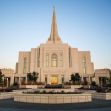James Huntsman, the brother of Utah’s former governor, Jon Huntsman, is suing the Church of Jesus Christ of Latter-Day Saints on grounds that the organization used donation money to finance their for-profit ventures.
Huntsman’s lawsuit explains that the LDS Corporation “dishonestly and fraudulently placed its own commercial financial interests above the loyalty and well-being of the Church’s most devout members.” Huntsman goes on to allege that the Church defrauded its members for decades because the LDS Corporation intentionally hid where donations were being allocated. The complaint accuses the church of “secretly lining its own pockets” by using members’ tithes to finance “a multi-billion dollar commercial real estate and insurance empire that had nothing to do with charity.”
As part of its fundraising efforts, the LDS corporation promised its members that donations would go toward the church’s worldwide charitable efforts. Additionally, donations were advertised to be used in a manner that would help those who needed financial assistance.
In a press conference held on October 8, 2003, the LDS Corporation doubled down on its message that money collected from donations would not go to the planned development of the City Creek Mall. In a statement made in the Church’s magazine, the Church re-emphasized, "no tithing funds will be used in the redevelopment." According to the complaint, the church publicly advertised at least five times that donated money would not be used to fund the Mall's development.
Huntsman argues otherwise and alleges that the LDS Corporation misused funds to help build the City Creek Mall which is a for-profit entity. It’s also alleged that money was also used to help bail out Beneficial Life Insurance, a private financial insurance company that was struggling to stay afloat. Huntsman alleges that the church was vocal that funds would not go toward either of these for-profit companies, yet donations were “brazenly and offensively” used to fund these ventures anyway.
In the complaint, Huntsman is specifically named as having millions of his own dollars being used in a manner not consistent with how funds were advertised to be used. According to the complaint, it’s estimated that roughly $1.5 billion were used to fund for-profit projects for at least two decades. In 2012, the Church changed the fine print of its tithing forms so that they read "the Church would use 'reasonable efforts'” instead of “all donations” would go toward “furthering the Church’s overall mission."
Huntsman’s complaint comes after an IRS whistleblower, David Nielsen, uncovered the alleged fraud. Nielsen was the former portfolio manager of the Church’s investment division, Ensign Peak Advisor.
A spokesman for the Church, Eric Hawkins, shared in a statement that donations made to the Church were done so “as an expression of their faith in God.” Hawkins adds that the donations were “used for a broad array of religious purposes, including missionary work, education, humanitarian causes and the construction of meetinghouses, temples and other buildings important to the work of the church, as reflected in scripture and determined by church leaders.”
As part of the complaint, Huntsman is seeking to have his donations returned to him so that he can re-donate them to organizations that would appropriately use the money.






